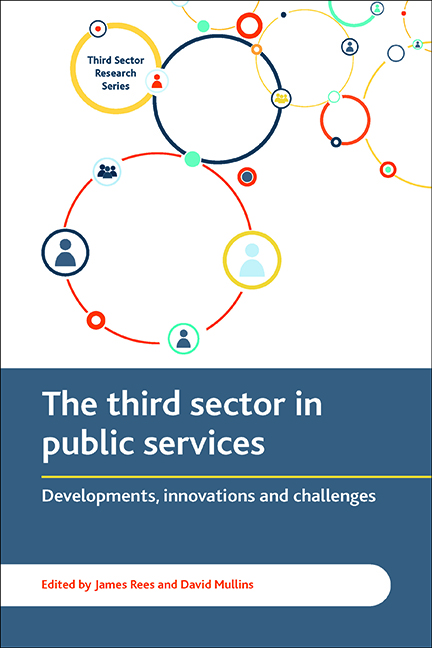Book contents
- Frontmatter
- Contents
- List of tables, figures and boxes
- Series editor’s foreword
- Notes on contributors
- one The third sector delivering public services: setting out the terrain
- Part One Policy, politics and organisations
- Part Two Cross-cutting issue for third sector service delivery
- Part Three Service delivery in key policy fields
- Index
eleven - The changing role of housing associations
Published online by Cambridge University Press: 05 April 2022
- Frontmatter
- Contents
- List of tables, figures and boxes
- Series editor’s foreword
- Notes on contributors
- one The third sector delivering public services: setting out the terrain
- Part One Policy, politics and organisations
- Part Two Cross-cutting issue for third sector service delivery
- Part Three Service delivery in key policy fields
- Index
Summary
Introduction
Housing is perhaps the ideal field in which to explore the argument that something has changed in public services involving the replacement of monolithic, hierarchical public sector organisations with a wider range of agencies funded and regulated by government. This chapter draws on a series of Third Sector Research Centre (TSRC) studies (referenced throughout the chapter) to assess changing roles for housing associations and other housing TSOs involved in public housing services. Tensions between state, market and community drivers of hybridity are revealed, with underlying implications for the independence, funding, activities and potential to challenge state policies by TSOs. Rather than being ‘distant uncles’ of the third sector (Mullins, 2010: 3), and despite having developed a distinct organisational field, housing associations have been at the centre of recent changes in the funding, role and independence of the third sector.
The market share of local authorities in the field of subsidised housing for low income groups in England has certainly declined from their zenith in 1979 when one in every three households rented housing from a local authority, to the present day when fewer than one in 12 is a council tenant. A large part of this change is accounted for by the growth of housing associations, non-profit distributing third sector bodies, who had a virtual monopoly of state capital subsidies for new housing from 1980 to 2010, and to whom over half of local authorities have now transferred their entire housing stock. Their market share has grown from one in 50 households in 1980 to one in 10 today.
However, this neat depiction of a shift of housing from state monopoly providers to a third sector field is complicated by a number of factors. Not least a change in which most public housing subsidy now reaches low-income households through personal subsidies rather than capital subsidies. Housing benefit has been one of the fastest increasing parts of the welfare budget, now standing at £24 billion and a significant share of this has supported the growth of the private rented sector, which is rapidly becoming the main tenure for low-income households seeking accommodation. Moreover, as the housing association sector has grown so too have individual associations, with the largest now having over 120,000 homes.
- Type
- Chapter
- Information
- The Third Sector Delivering Public ServicesDevelopments, Innovations and Challenges, pp. 211 - 232Publisher: Bristol University PressPrint publication year: 2016

